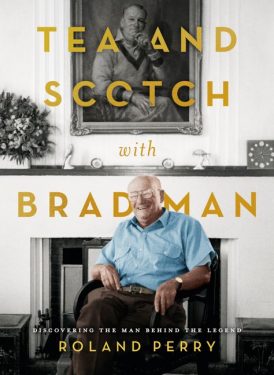Tea and Scotch with Bradman
Archie Mac |Published: 2019
Pages: 335
Author: Perry, Roland
Publisher: ABC
Rating: 3.5 stars

Roland Perry does not always receive a fair deal from the fourth Estate. He is often criticised for a lack of cricket knowledge and on a couple of occasions apocryphal story telling. This was particularly true when some insinuated that he made up Bradman’s All Time XI. I think some of these censorious comments are simple jealousy due to the fact that Bradman chose Perry as the journalist to confide in. After all, some of the greats, such as Michael Parkinson were rejected by Sir Donald, and Parkinson openly admits that not having the opportunity to interview Bradman is one of his greatest professional regrets.
Perry has certainly taken advantage of his access to the Don, and his latest offering, by my count at least, is his fifth book with Bradman as the main focus. Perry is not finished yet, with the recent release of Bradman Vs Bodyline.
Tea and Scotch with Bradman is essentially a biography, although not as comprehensive as his The Don which was almost twice as long. Tea and Scotch with Bradman is a more laid back biography and is more selective of Bradman’s cricketing career. There is also more focus on his post cricket life.
Perhaps the most interesting theme of the book is Perry’s direct dealings with Bradman. The great man describes them as having a friendship and occasionally contacts Perry to discuss personal issues.
The interaction between the interviewer and his subject provides a window into Bradman that no one else has been able to deliver in the hundreds of books written on him. The awe and respect Perry has for his subject comes across in the examples Perry provides, and in which, he always appears a little wary of Bradman. The reputation Bradman had of not tolerating fools and his dislike of small talk probably accounts for Perry’s cautious approach. For example, he sometimes states that he was unsure whether Bradman was kidding or not in some of their interactions, but there are no examples provided by Perry of clarifying these moments of confusion with The Don.
It’s clear that this book is directed at a much wider audience than just the knowledgeable cricket fan. Perry often explains things that the Cricket Tragic takes as a given. Such as when Douglas Jardine is mentioned in the book’s introduction, Perry tells the readers that Jardine was the architect of the infamous Bodyline tactics.
My only issue with Perry, is some of the statements he makes as facts. Such as the 1938 team being one of the weakest in Australian history. I am not sure a team that included, apart from Bradman, Stan McCabe, Sid Barnes, Bill Brown, Lindsay Hassett and Bill O’Reilly could be deemed weak. If they were short of a quality bowler and keeper/batsman, then Bradman as selector and captain should wear most of the blame for leaving out Clarrie Grimmett and Don Tallon. Bradman said the former was difficult to manage and you can only assume Tallon was left out due to player trading between the states.
I would not go as far as to describe Tea and Scotch with Bradman as a hagiography, although it’s pretty close, with the author not accepting any criticism of his subject as being warranted. So if you want a warts and all biography of Bradman then give this book a miss. If however you want a unique perspective of the greatest batsmen in the history of the game, then you should look no further than Tea and Scotch with Bradman.
Just on a side note, Perry relays in this book that he is mates with the Aussie Rules legend Ron Barassi (think Sir Bobby Charlton in soccer) and a long suffering Melbourne Demons supporter. I mention this because the Demons are a chance to win their first premiership since 1964, *this weekend. Go the Dees!
*The result will be known by the time this review goes up.






Leave a comment